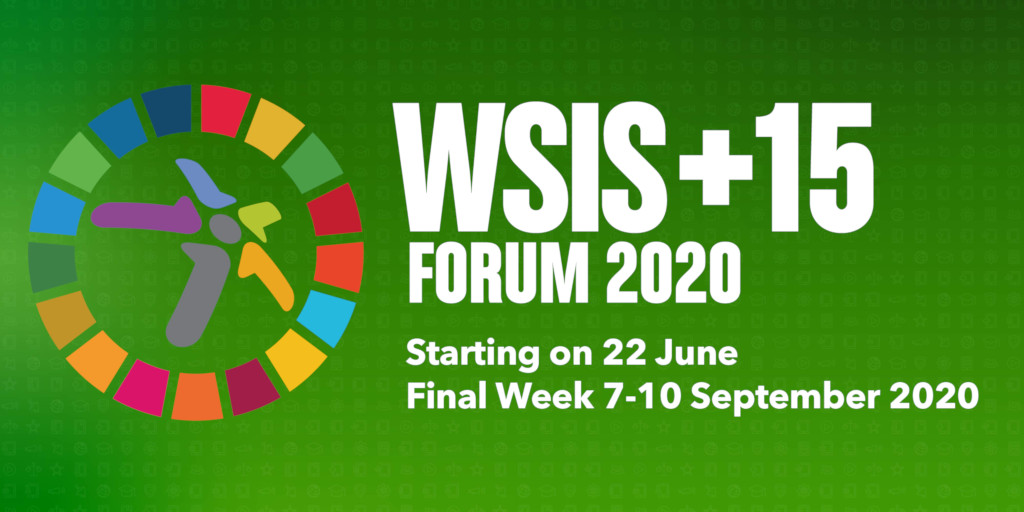WSIS 2020 – Official opening segment: Opening ceremony
7 Sep 2020 12:00h - 13:00h
Event report

The moderator, Mr Catalin Marinescu (Head of Corporate Strategy Division, ITU), welcomed the speakers and attendees to the last week of WSIS 2020. A video was presented to summarise this online meeting of the Summit and its highlights. The video listed several statistics such as the number of attendees and speakers, their demographics, and some of the main sessions and their themes.
Mr Houlin Zhao (Secretary General of the International Telecommunications Union) provided opening remarks and welcomed the attendees. Due to the new possibilities opened by online discussion, the numbers attending this WSIS surpassed that of previous years, as every year the information society itself changes and grows. Fifteen years ago, during the first WSIS, only 16 percent of the world was connected to the Internet, in comparison to today’s 54 percent. Despite this rapid increase, the challenge remains; studies estimate it should take 30 years to connect the other 46 percent.
The United Nations Conference on Trade and Development (UNCTAD) is proud to be an organiser of the 2020 WSIS, in a time when digital technologies are playing an important role in daily lives, accentuated by the COVID-19 crisis, stated Ms Isabelle Durant (Deputy Secretary-General, UNCTAD). These technologies are supporting the recovery process, but the crisis has also put a spotlight on the growing digital divide between connected and unconnected countries and populations within countries. She highlighted the work of the United Nations Group on Information Society in ensuring all parts of the UN take the digital dimension fully into account in their work. There needs to be a dialogue on the role of digitalisation and how it can help achieve the SDGs.
Mr Xing Qu (Deputy Director-General, UNESCO) stressed that digital transformation and global partnership are two goals towards which UNESCO works to create inclusive knowledge societies. Empowering local communities by increasing access and harnessing the power of ICTs are two ways of doing so. Digital transformation is playing a huge role in the COVID-19 crisis. The last decade has witnessed a fast development in technology and ICTs, and consequently has raised issues related to privacy, safety, ethics, radicalisation online. Over the years, WSIS has addressed these challenges and proposed concrete solutions by ensuring active stakeholder involvement. UNESCO currently serves as facilitator of several WSIS lines and believes that digital transformation is needed for inclusive and sustainable development and enhanced cooperation. Citizens need critical thinking, literacy, and the digital competency required to use and access information online. The power of digital transformation to achieve the SDGs and the free flow of ideas can never be understated.
This year’s WSIS was unique and of an unprecedented character due to the COVID-19 crisis and the demand it created for remote participation for speakers and attendants. The crisis constituted a test to the world’s preparedness and readiness, and the ICT sector helped individuals and societies communicate, working as a safety valve and a tool for development and prosperity. The WSIS remains after all a relevant forum for stakeholders to meet and examine ideas. The United Arab Emirates have been prominent supporters of WSIS, said H. E. Majed Sultan Al Mesmar (Deputy Director General, Telecommunications Regulatory Authority, UAE). The COVID 19 crisis showed the strength of the country’s ICT sector as it quickly shifted towards working remotely, employing smart apps.
During the last three years, Saudi Arabia has doubled its Internet speed, increasing its Internet penetration rate to above 95 percent with high download speed. Its government has been providing all capabilities necessary to confront the COVID-19 pandemic, such as remote working. This has resulted in an increase in traffic data consumption, but the country’s infrastructure managed to support it thanks to early investment. According to H. E. Dr Mohammed Saud Al-Tamimi (Governor, Communications and Information Technology Commission (CITC), Saudi Arabia), Saudi Arabia will continue to support ICT development and education, and remain as one of the main supporters of WSIS.
The COVID-19 pandemic requires global partnerships in science and technology innovation. Digital solutions have played a critical role in enabling social services including education and healthcare and digital government during the pandemic, as countries locked down. Many governments sought to explore new ways to provide information to the public and work with stakeholders to fight misinformation and disinformation. Some of these new ways included new tools, hackathons, eServices, virtual medical consultations, and others. Not all countries, however, have been able to take advantage of such solutions due to the digital divide, believes Mr Liu Zhenmin (Under-Secretary General, UNDESA).
The integration of ICT within the global manufacturing sector has become a reality and the fourth industrial revolution has become an accelerator of digitalisation. Technology has achieved great importance in all areas of manufacturing, and UNIDO will take advantage of the opportunities brought on by digitalisation. It seeks to convene leaders to discuss the sustainable development of Industry 4.0. Mr Li Yong (Secretary General of UNIDO) believes WSIS can be an important instrument in providing skills and knowledge and in creating partnerships to accelerate progress towards the SDGs.
COVID-19 has had a great consequences for the aviation industry, stated Ms Fang Liu (Secretary General of ICAO). Many who relied on tourism and revenues for their livelihood found themselves in a difficult situation. Yet opportunities for new technologies and innovations in the aviation industry have arisen. These innovations permit more security, allow the development of autonomous aircraft, and create more jobs. This has led to greater mobility, increased electronic commerce, and reduced emissions. The world post-COVID has to be a greener and more sustainable world.
Ms Armida Salsiah Alisjahbana (Executive Secretary, UNESCAP) explained how, in the Asia-Pacific region, many have been left behind during the COVID-19 crisis due to challenges faced by the region: it is digitally divided and largely disconnected, with less than 10 percent of its population able to access the Internet. There is a great need, therefore, for government-led investment, coupled with a need to strengthen digital infrastructure. An important step might be to create an Internet exchange point for the region to improve its connectivity and speed. It would also help scale up investments and digital literacy.
Digital WSIS, overall, has been a success, bringing many interesting insights on the SGDs. H. E. Ms Katrina Naut (Ambassador and Representative of the Permanent Mission of the Dominican Republic in Geneva) explained how Latin America has managed to lift millions out of poverty, but still needs to reduce inequality, the digital divide, and the gender divide.
Related topics
Related event

